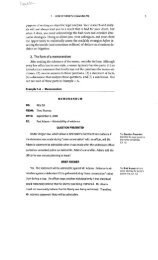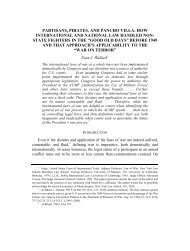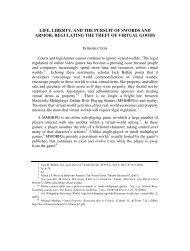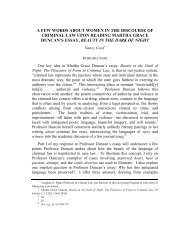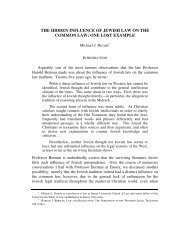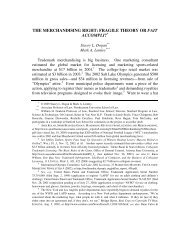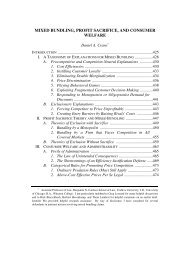Chimera and the Continuum of Humanity - Emory University School ...
Chimera and the Continuum of Humanity - Emory University School ...
Chimera and the Continuum of Humanity - Emory University School ...
You also want an ePaper? Increase the reach of your titles
YUMPU automatically turns print PDFs into web optimized ePapers that Google loves.
360 EMORY LAW JOURNAL [Vol. 55<br />
seems to impose no subject matter restriction on <strong>the</strong> patentability <strong>of</strong> human<br />
beings under <strong>the</strong> Patent Act, <strong>and</strong> <strong>the</strong> PTO cannot unilaterally insert one. 103 In<br />
addition, <strong>the</strong> PTO’s more recent reliance on <strong>the</strong> moral utility doctrine in its<br />
1998 media advisory to attack <strong>the</strong> usefulness <strong>of</strong> a chimera patent is legally<br />
unsound because <strong>the</strong> doctrine has been largely rejected in recent years. 104 If<br />
asserted by <strong>the</strong> PTO as a limitation on patentability, any application <strong>of</strong> <strong>the</strong><br />
moral utility doctrine “is bound to be overturned in court.” 105 Even if <strong>the</strong>re<br />
were still an established moral utility test in U.S. patent law, 106 <strong>the</strong>re is a strong<br />
argument that <strong>the</strong> moral utility would favor allowing patents on chimera<br />
because <strong>of</strong> <strong>the</strong> possible benefits to medical research. 107<br />
Given <strong>the</strong> expansive scope <strong>of</strong> <strong>the</strong> Patent Act, <strong>the</strong> most substantial<br />
arguments against chimera patentability rest on o<strong>the</strong>r constitutional provisions<br />
that may independently bar chimera patentability. 108 These arguments require<br />
an interpretation <strong>of</strong> <strong>the</strong> Constitution to determine first if <strong>the</strong> Constitution <strong>and</strong><br />
its protections even apply to human-animal chimera <strong>and</strong> second, if <strong>the</strong><br />
threshold question is satisfied, if o<strong>the</strong>r constitutional provisions do in fact bar<br />
chimera patents. 109 The PTO, however, is not <strong>the</strong> proper body to make <strong>the</strong>se<br />
ultimate determinations. The role <strong>of</strong> <strong>the</strong> PTO is to administer <strong>the</strong> law, not to<br />
<strong>the</strong> ‘particular application[s] . . . contemplated by <strong>the</strong> legislators.’ This is especially true in <strong>the</strong> field <strong>of</strong> patent<br />
law. . . . Congress employed broad general language in drafting § 101 precisely because such inventions are<br />
<strong>of</strong>ten unforeseeable.” Chakrabarty, 447 U.S. at 315–16 (citations omitted).<br />
103 See Bagley, supra note 63, at 498 (stating that “[s]ection 101 <strong>of</strong> <strong>the</strong> Patent Act, as interpreted,<br />
encompasses ‘anything under <strong>the</strong> sun that is made by man,’ including, apparently, animals <strong>and</strong> even o<strong>the</strong>r<br />
men”).<br />
104 No court has relied on <strong>the</strong> moral utility doctrine in rejecting a patent since <strong>the</strong> PTO Board <strong>of</strong> Appeals<br />
held that a gambling device was patentable in 1977. Ho, supra note 82, at 249; see Lauren Cirlin, Comment,<br />
Human or Animal: A Resolution to <strong>the</strong> Biotechnological Blurring <strong>of</strong> <strong>the</strong> Lines, 32 SW. U. L. REV. 501, 514–15<br />
(2003) (noting that moral questions are highly subjective <strong>and</strong> allowing <strong>the</strong> PTO to make such judgments would<br />
inject damaging uncertainty into patent law). But see Tol-O-Matic, Inc. v. Proma Produkt-und Mktg.<br />
Gesellschaft, 945 F.2d 1546, 1553 (Fed. Cir. 1991).<br />
105 Bagley, supra note 63, at 492. Pr<strong>of</strong>essor Bagley goes on to note that “it would be difficult in <strong>the</strong><br />
extreme to resurrect a rule which . . . does not exist under <strong>the</strong> current patent statute.” Id. at 493.<br />
106 Europe does have a moral utility requirement in patent law. Young-Gyoo Shim, Intellectual Property<br />
Protection <strong>of</strong> Biotechnology <strong>and</strong> Sustainable Development in International Law, 29 N.C. J. INT’L L. & COM.<br />
REG. 157, 220–21 (2003).<br />
107 Kopinski, supra note 6, at 657 (stating that “<strong>the</strong> moral utility test in patent law is not particularly useful<br />
in a patent application for human-nonhuman chimeras, because <strong>the</strong> utilitarian arguments would inevitably<br />
outweigh <strong>the</strong> deontological arguments”); see Magnani, supra note 35, at 456.<br />
108 See Weiss, supra note 18 (listing constitutional privacy rights, <strong>the</strong> Thirteenth Amendment, <strong>and</strong> <strong>the</strong><br />
right to travel as barriers asserted by <strong>the</strong> PTO against chimera patentability).<br />
109 While several commentators have addressed <strong>the</strong> patentability <strong>of</strong> chimera, <strong>the</strong> threshold question <strong>of</strong> <strong>the</strong><br />
constitutional personhood <strong>of</strong> chimera has not been well addressed in <strong>the</strong> current literature <strong>and</strong> is <strong>the</strong>refore <strong>the</strong><br />
focus <strong>of</strong> this Comment.



